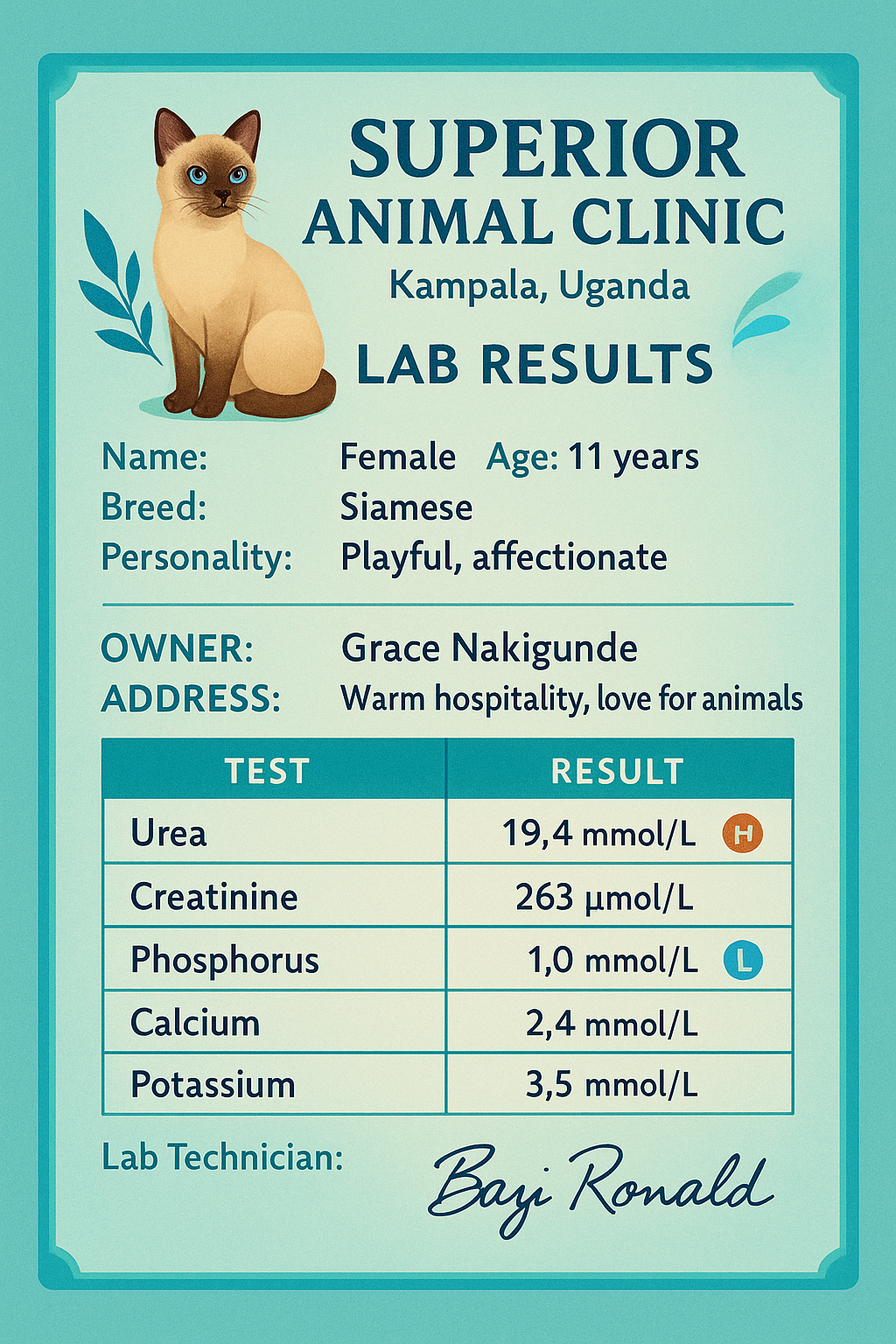
💔 When Your Cat Starts Vomiting, It’s More Than Just Sickness — It’s a Cry for Help You Can’t Ignore
You know your cat better than anyone.
You can tell when the meow sounds different… when they stare at the water bowl longer than usual… when the playful spark in their eyes starts to fade. Then one day, you notice your cat is vomiting again, refusing to eat, losing weight, and hiding in corners.
It’s heartbreaking — and scary. You search online for “why is my cat puking?” or “best vet near me in Kampala for cats that are not eating”, hoping for answers. You’re not alone. Every week at Superior Animal Clinic, we meet caring cat owners from Ntinda, Muyenga, Bugolobi, Makindye, Buziga, Munyonyo, Katwe, and all across Kampala facing the same fear:
“My cat is getting weaker, and I don’t know what’s wrong.”
In many cases, the culprit is kidney disease — one of the most common but often overlooked causes of vomiting and weight loss in cats across Uganda. It creeps in silently, and by the time symptoms appear, your furry friend may already be in danger.
But here’s the good news: with quick diagnosis and expert treatment, cats with kidney disease can still live happy, healthy lives.
At Superior Animal Clinic in Makindye along Salaama Road, we don’t just treat sick cats — we help families save the pets they love most.
Because to us, your cat isn’t “just a pet.”
They’re family — and they deserve the best care possible. ❤️🐾
😿 What Is Kidney Disease in Cats?
Kidney disease happens when your cat’s kidneys stop working properly — meaning they can’t remove waste and toxins from the blood. This leads to a buildup of harmful substances that make your cat feel sick.
There are two main types:
- Acute Kidney Disease – develops suddenly, often due to infections, toxins, or dehydration. It can be reversed if treated early.
- Chronic Kidney Disease (CKD) – develops slowly over time and is more common in older cats. It requires long-term management.
🐱 Common Signs of Kidney Disease in Cats in Kampala, Uganda
Many cat owners across Kampala visit Superior Animal Clinic worried because their cats have started acting “off.”
Some say their cat has been vomiting a lot, others notice weight loss, reduced appetite, or that their cat has suddenly become quiet and withdrawn.
What most don’t realize is that these are often early warning signs of kidney disease — one of the leading causes of illness and death among cats in Uganda.
Below are the most common symptoms cat owners in Kampala should watch for 👇
😿 1. Persistent Vomiting or Puking
If your cat keeps vomiting — especially watery, foamy, or yellowish fluid — it may not just be “a bad stomach.”
Vomiting is one of the earliest signs of kidney disease because toxins that the kidneys can’t filter build up in the blood, making your cat nauseous.
👉 If you’re Googling “why is my cat puking every day?” or “my cat keeps vomiting and not eating,” this could be a sign of kidney failure that needs urgent vet attention.
🍽️ 2. Loss of Appetite and Weight Loss
Kidney disease makes cats lose interest in food. Even their favorite meals stop appealing to them.
If your cat is not eating, eating less, or losing weight, don’t assume it’s just being picky — it could mean their kidneys are struggling.
At Superior Animal Clinic, we often see cats that have lost significant weight before diagnosis — early detection could have saved them from severe decline.
💧 3. Drinking Too Much Water (Polydipsia)
Cats with kidney disease drink a lot more water than usual. You might notice your cat spending more time at the water bowl or even drinking from unusual places like taps or toilets.
Their body is trying to flush out toxins, but the kidneys can’t keep up — causing constant thirst and dehydration at the same time.
🚽 4. Frequent or Excessive Urination
If you’re cleaning the litter box more often or seeing your cat urinate outside their usual spots, this could be another red flag.
Kidney disease causes cats to pass large amounts of diluted urine because the kidneys lose their ability to concentrate it.
Some cat owners in Kampala describe it as “my cat’s pee looks like water.”
😿 5. Lethargy, Weakness, or Sleeping Too Much
Cats with kidney disease tend to sleep more, move less, and lose interest in play.
They become quieter, sometimes hiding under furniture or staying in one place for hours.
If your cat feels unusually cold to touch, wobbly when walking, or generally weak — it’s time to see a vet immediately.
👃 6. Bad Breath and Mouth Ulcers
One of the classic but often ignored signs of kidney disease is a strong, ammonia-like odor coming from your cat’s mouth.
This “urine smell” is caused by toxins in the bloodstream. In severe cases, ulcers may form on the tongue or gums.
If your cat’s breath smells bad even after brushing or dental cleaning, the kidneys may be the real problem.
🐾 7. Dehydration and Dry Coat
Dehydration is very common in cats with kidney problems. You may notice sunken eyes, dry nose, and flaky or rough fur.
Even when your cat drinks more, their body loses water faster than it can replace it.
At Superior Animal Clinic, we rehydrate cats safely using IV fluids to restore balance and comfort.
❤️ 8. Behavioral Changes and Sadness
Cats are masters at hiding pain, but subtle changes can tell you something’s wrong.
Your usually social cat may become distant, irritable, or start avoiding touch.
Some cats cry softly, while others hide for long periods. These emotional signs often appear before the physical ones become obvious.
🕒 9. Late-Stage Symptoms to Never Ignore
If left untreated, kidney disease can progress to severe stages leading to:
- Seizures or tremors
- Drooling and foul-smelling vomit
- Complete loss of appetite
- Muscle wasting and extreme weakness
- Collapse or coma
At this stage, urgent veterinary care is the only way to give your cat a chance to recover.
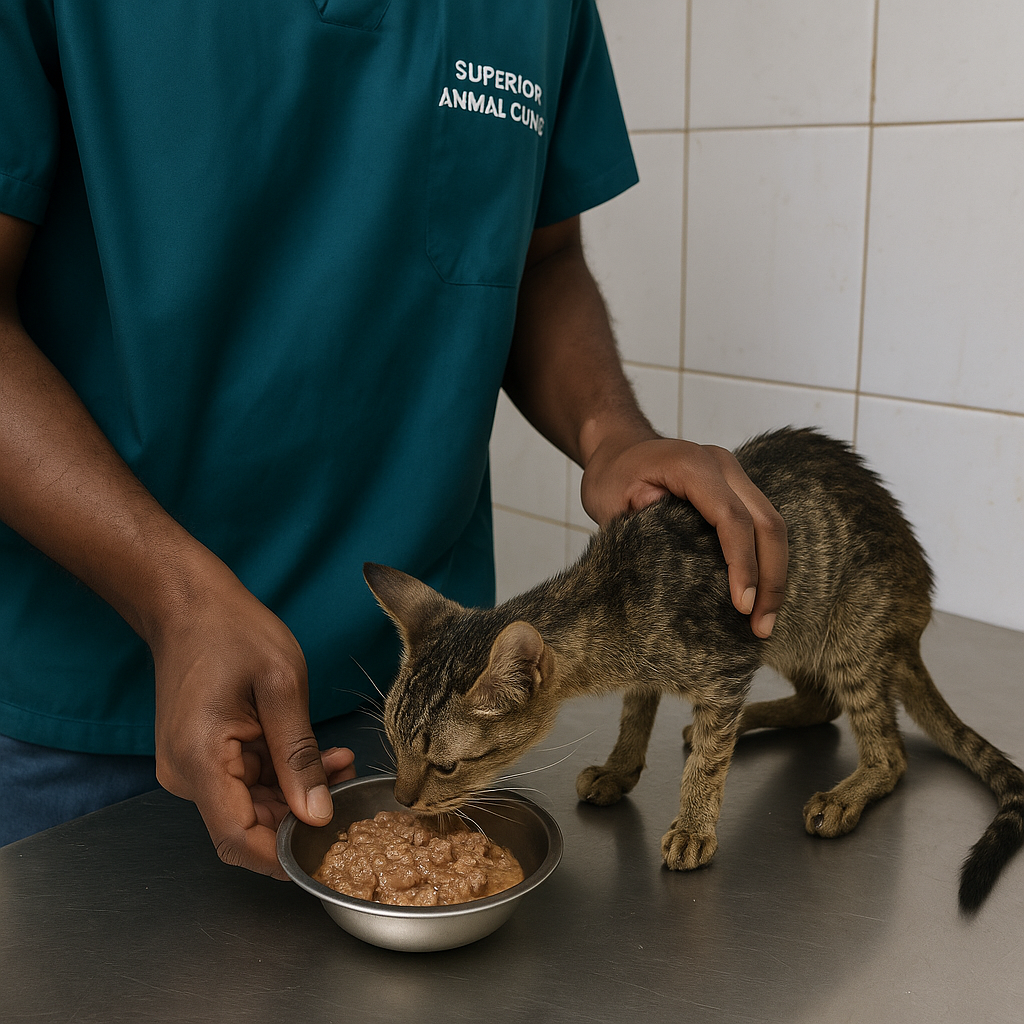
🩺 When to Visit Superior Animal Clinic
If your cat shows even one of the signs above — vomiting, not eating, drinking too much, or acting tired — please don’t wait.
Visit Superior Animal Clinic in Makindye along Salaama Road, where our experienced veterinarians will:
- Perform blood and urine tests
- Conduct ultrasound scans
- Start IV fluid therapy and medication immediately if needed
Early treatment saves lives and can add years to your cat’s life.
🧪 Causes of Kidney Disease Among Cats in Uganda
Kidney disease in cats doesn’t happen overnight — it develops quietly over time, often triggered by environmental factors, diet, infections, and lifestyle conditions that are common across Kampala and other parts of Uganda. Understanding these causes can help you protect your cat before it’s too late.
Below are the most common causes of kidney disease among cats we see at Superior Animal Clinic in Makindye, Kampala:
1. 💧 Chronic Dehydration (Especially in Hot Areas of Kampala)
Uganda’s warm climate — particularly in places like Makindye, Katwe, Buziga, and Nsambya — makes cats prone to dehydration. Many cats don’t drink enough water, especially if they’re on dry kibble diets. Over time, this forces the kidneys to work harder, damaging kidney tissue and reducing function.
💡 Tip: Encourage your cat to drink by offering wet food or using a pet fountain, especially during the dry season.
2. 🦠 Bacterial Infections (Like E. coli and Leptospirosis)
Contaminated water or spoiled food can expose cats to bacteria such as E. coli, a leading cause of urinary tract and kidney infections in Uganda. These infections cause inflammation and scarring of the kidneys, leading to chronic kidney disease.
Cats allowed outdoors in areas like Kasubi, Lungujja, Rubaga, and Mityana, where open drainage systems are common, are especially at risk.
3. ☠️ Toxins and Poisons in the Environment
Many cases of sudden (acute) kidney failure in cats at Superior Animal Clinic are caused by accidental poisoning.
Common toxic substances include:
- Rat poison (a major issue in urban Kampala homes)
- Human medications such as paracetamol or ibuprofen
- Household cleaners and detergents
- Ingested plants like lilies — which are highly toxic to cats
Even small doses can permanently damage the kidneys.
4. 🍗 Poor or Inappropriate Diets
Feeding cats leftover human food, bones, or high-salt meals (common in many homes in Uganda) strains their kidneys.
Cats are obligate carnivores — their kidneys are built to process protein, not salt or carbohydrates. Over time, poor diet contributes to kidney inflammation and toxin buildup.
At Superior Animal Clinic, we always recommend balanced cat diets or prescription renal foods for cats with early kidney signs.
5. 🧬 Genetic and Breed-Related Factors
Some breeds are naturally more prone to kidney issues.
In Uganda, we often see chronic kidney disease in:
- Persians and Siamese cats (due to hereditary kidney problems)
- British Shorthairs and Maine Coons (prone to urinary crystal formation)
Even local Ugandan mixed-breed cats can develop genetic kidney weakness, especially as they age.
6. 🦷 Untreated Dental and Mouth Infections
Many cat owners don’t realize that dental infections can spread bacteria through the bloodstream to the kidneys.
At Superior Animal Clinic, we’ve treated cats whose kidney issues started as simple gum infections or rotten teeth.
That’s why regular dental cleaning and oral checkups are vital.
7. 💊 Side Effects of Certain Medications
Some over-the-counter medicines — especially painkillers or antibiotics given without vet prescription — can harm feline kidneys.
Always consult your vet before giving your cat any human medication or unprescribed drugs.
8. ⏳ Aging and Natural Degeneration
Older cats (above 7 years) commonly suffer from chronic kidney disease due to gradual wear and tear of kidney tissues.
Just like humans, the kidneys lose efficiency with age — making early screening at your vet clinic critical for prevention.
9. 🐜 Parasite Damage and Poor Hygiene
Untreated fleas, ticks, and intestinal worms can indirectly lead to kidney stress through anemia and blood infections.
Cats living outdoors or in crowded homes — especially in Nsambya, Katwe, Ndejje, and Kasubi — are at higher risk.
Routine deworming and parasite control significantly reduce kidney disease risk.
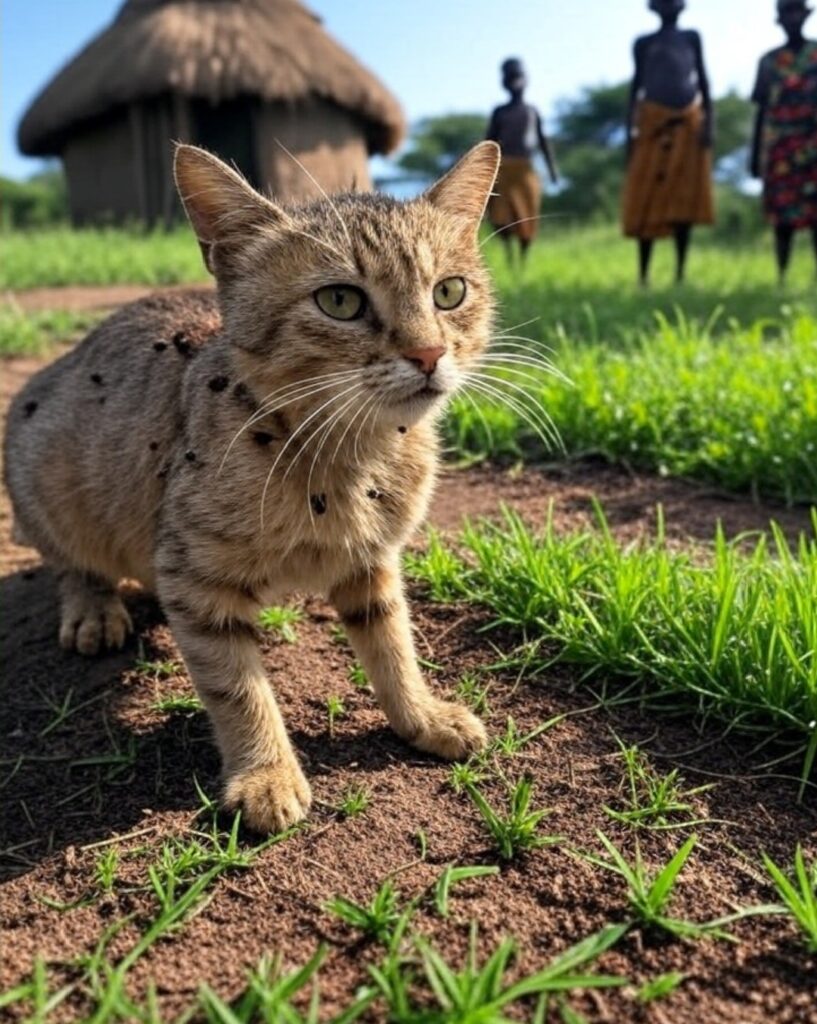
10. 🚱 Limited Access to Clean Drinking Water
Cats that drink tap or drainage-contaminated water (a common problem in urban Kampala) may ingest bacteria, heavy metals, or chemicals that slowly damage kidney tissues.
Providing boiled and cooled clean water is a simple but powerful way to protect your cat’s kidneys.
11. 🐾 Repeated or Untreated Urinary Tract Infections (UTIs)
Cats in areas like Bugolobi, Ntinda, and Muyenga often suffer from recurring urinary infections — especially female cats. When these infections are ignored or treated halfway, bacteria travel upward into the kidneys, causing chronic inflammation and scarring.
Over time, this leads to permanent kidney damage and chronic kidney disease (CKD).
💡 Tip: If your cat strains to urinate, cries in the litter box, or passes little urine, bring them to Superior Animal Clinic immediately for urine analysis.
12. 🐈 Prolonged Stress and Environmental Changes
Cats are very sensitive animals. Constant stress — such as moving homes, new pets, loud environments, or neglect — can weaken their immune system, making them more vulnerable to infections and kidney strain.
Urban cats in Kololo, Lubowa, and Lugogo, who often stay indoors with little stimulation, are especially prone to stress-related urinary and kidney issues.
13. 🧴 Exposure to Household Chemicals and Pesticides
Cats often walk or sleep on treated floors, gardens, or sofas cleaned with strong chemicals. When they lick their paws afterward, they ingest toxins that burden their kidneys.
Common culprits include:
- Insect sprays used in homes around Nsambya, Nakasero, and Mutundwe
- Car antifreeze leaks (ethylene glycol)
- Disinfectants like phenols and bleach
Even small doses can damage feline kidneys permanently.
14. 🩸 Anemia and Chronic Blood Loss
Cats suffering from untreated flea infestations, intestinal worms, or chronic illness often become anemic. When the blood lacks enough oxygen, the kidneys receive reduced blood flow, leading to gradual tissue death.
This is common in outdoor cats across Katwe, Kasubi, and Ndejje, where parasites are widespread.
15. 🌡️ Severe Heat and Dehydration During Uganda’s Hot Seasons
During dry months, temperatures in Makindye, Zana, and Buziga can rise above 30°C. Cats that stay outdoors or lack enough shade and water experience severe dehydration.
Even short-term dehydration increases the concentration of toxins in the blood, which damages kidney filters (nephrons). Repeated episodes of this cause chronic kidney failure.
16. 🦠 Feline Viral Diseases (FIV, FeLV, and FIP)
Certain viruses such as Feline Immunodeficiency Virus (FIV), Feline Leukemia Virus (FeLV), and Feline Infectious Peritonitis (FIP) can directly damage kidney tissues or weaken the immune system, leading to secondary infections.
At Superior Animal Clinic, we routinely test sick cats for these viruses, especially if they show chronic vomiting, weight loss, or swollen abdomen.
17. 🧂 Excessive Sodium and Low-Quality Cat Food
Cheap or poorly balanced cat food sold in local shops may contain too much salt or low-grade protein. Over time, this overloads the kidneys, especially when the cat doesn’t drink enough water.
Feeding your cat leftover human meals, chips, or soups makes it worse — salt and seasoning cause irreversible kidney strain.
18. 🪰 Chronic Parasite Burden and Toxin Release
When cats have heavy worm infestations, especially hookworms, their body constantly releases toxins from the parasites’ metabolism. These toxins are filtered by the kidneys, eventually wearing them down.
Cats in semi-outdoor environments like Rubaga, Nakawa, and Mityana are especially at risk. Regular deworming every 3 months helps prevent this.
19. 🧫 Fungal and Protozoal Infections
Though less common, infections such as toxoplasmosis or fungal spores from contaminated soil can cause inflammation inside the kidneys.
Outdoor cats that hunt birds, rats, or eat raw meat are more exposed.
These infections can go unnoticed for months until vomiting and weight loss appear.
20. ⚙️ Kidney Stones and Urinary Blockage
Some cats — especially males — develop crystals or stones that block urine flow. When urine can’t pass out, pressure builds up in the kidneys, damaging delicate tissue.
In neighborhoods like Muyenga, Bugolobi, and Ntinda, where cats are often on dry food diets and less active, this is a major cause of acute kidney injury.
21. 🧠 Neglected Early Warning Signs and Late Diagnosis
Many cases we treat at Superior Animal Clinic started with small symptoms — a bit of vomiting, loss of appetite, or extra thirst — that owners ignored.
Because cats hide pain so well, by the time they reach us, kidney disease is already advanced.
That’s why early vet visits are crucial, even for mild signs of illness.
22. 🍼 Feeding Cow’s Milk and Human Beverages
A common myth in Uganda is that cats love milk — but adult cats cannot digest lactose. Feeding cow’s milk regularly causes dehydration and stress on the kidneys.
Even small amounts of tea, juice, or soup can lead to electrolyte imbalance and long-term kidney strain.
23. 💔 Neglect, Malnutrition, and Street Life
Abandoned or stray cats around Old Kampala, Katwe, and Lungujja often suffer from poor nutrition, infections, and long-term dehydration — the perfect setup for chronic kidney disease.
Many of these cats end up rescued and brought to Superior Animal Clinic for emergency care.
24. 💧 Low Urine Output or Poor Litter Hygiene
Cats are picky about their litter boxes. If the box is dirty, they hold urine for too long, which increases toxin buildup in the kidneys.
Indoor cats in Kololo, Naguru, and Bukoto are commonly affected.
Maintaining a clean litter box and encouraging regular urination keeps kidneys healthy.
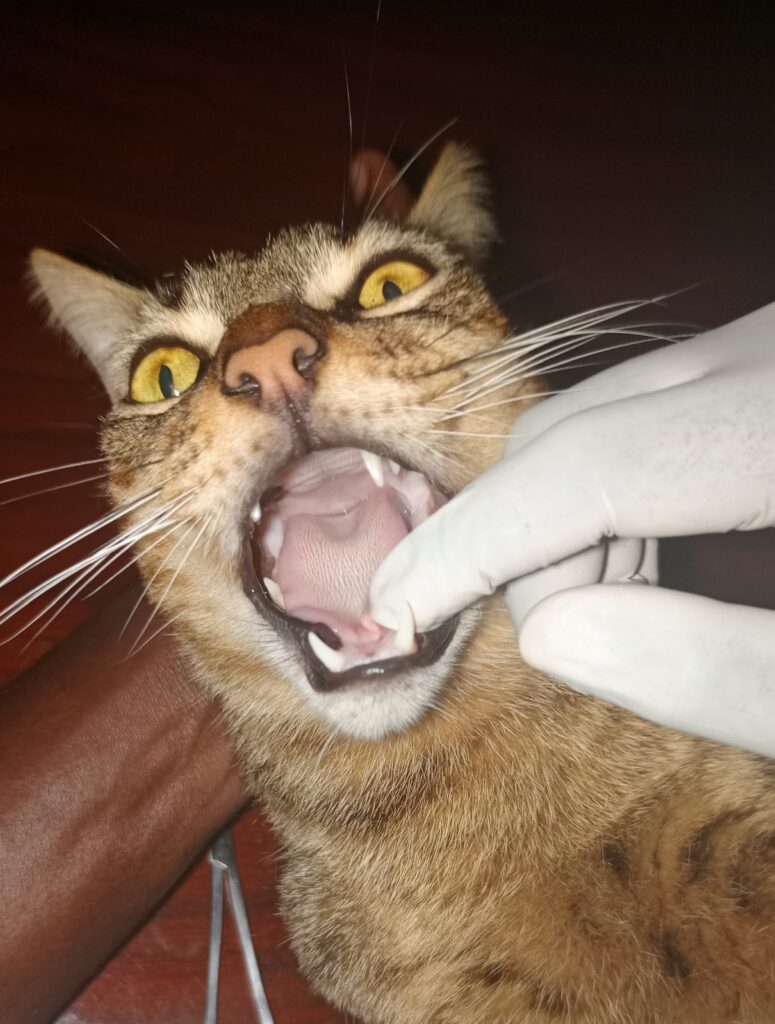
25. 🧍 Obesity and Lack of Exercise
Overweight cats have slower metabolism and poor blood flow, including to the kidneys.
Sedentary indoor lifestyles, common in Kampala’s apartments and estates, can indirectly contribute to kidney strain.
Regular play and a balanced diet can help prevent this hidden risk.
🩺 Summary
In Uganda, most kidney disease cases in cats result from a mix of dehydration, infections, toxins, and poor nutrition — all preventable with proper care.
At Superior Animal Clinic, our team helps cat owners understand these risks and take the right preventive steps, including regular checkups, hydration support, and dietary counseling.
If your cat has been vomiting, refusing food, or acting tired, don’t wait — it could be the first sign of kidney damage.
Visit Superior Animal Clinic in Makindye along Salaama Road today for a professional diagnosis and treatment plan.
🐾 Cat Breeds in Uganda Most Affected by Kidney Disease — and Why
Kidney disease can affect any cat, but at Superior Animal Clinic we see clear patterns: certain breeds — and the local mixed-breed population — show up more often with kidney problems. Below is a breed-by-breed breakdown, what makes them vulnerable, the signs to watch for, and what you should do if you own one.
1. Persian & Exotic Shorthair Cats — High risk (think PKD)
Why they’re at risk
- Persians commonly carry polycystic kidney disease (PKD), a genetic condition where fluid-filled cysts form in the kidneys and slowly destroy healthy tissue.
- Their facial anatomy also predisposes them to dental disease and breathing issues, which can indirectly worsen kidney health.
What owners in Kampala should watch for
- Repeated vomiting, loss of appetite, increased thirst, weight loss, poor coat condition.
- Often shows up in middle-aged to older Persians but can be seen earlier if PKD is severe.
What Superior Animal Clinic recommends
- Early ultrasound screening to look for kidney cysts, plus baseline bloodwork (urea, creatinine) and urine tests.
- If PKD is confirmed, we create a long-term care plan: hydration support, kidney-friendly diet, regular monitoring, and treatment of complications.
- Genetic counselling and advice on breeding (avoid breeding affected cats).
2. Siamese & Oriental Breeds — Moderate risk (familial tendencies + stressors)
Why they’re at risk
- Siamese-type breeds can have hereditary tendencies toward renal problems and may show earlier-onset chronic kidney disease. Stress, poor diet, and dehydration accelerate progression.
What owners should watch for
- Lethargy, vomiting, sudden behavior changes, frequent drinking and urination.
What Superior Animal Clinic recommends
- Regular annual blood and urine screening from middle age (6–8 years) and earlier if you notice symptoms.
- Focus on hydration, high-quality wet food, and early treatment for infections.
“Siamese cat vomiting Kampala — could it be kidney disease? Get checked at Superior Animal Clinic.”
3. British Shorthair & Other Purebreds — Variable risk (age + genetics)
Why they’re at risk
- Some purebreds develop kidney disease due to breed-associated genetics or because they live longer (age is the biggest risk factor). Dental disease and obesity also play a role.
What owners should watch for
- Slow weight loss, poor appetite, bad breath, and recurring vomiting.
What Superior Animal Clinic recommends
- Baseline bloodwork at 5–7 years old, then yearly checks; dental cleaning and weight control to reduce risk factors.
“Best vet for British Shorthair kidney check near me Makindye.”
4. Local Mixed-Breed Cats (the majority in Kampala) — Commonly affected (environmental + nutrition)
Why they’re at risk
- Most cats roaming or semi-roaming in Kampala are mixed-breed. They face mixed diets, exposure to toxins, inconsistent access to clean water, and untreated infections — all contributors to kidney disease.
- Outdoor life increases risk of toxin exposure (pesticides, contaminated water) and trauma.
What owners should watch for
- Sudden collapse, repeated vomiting, drinking lots of water, foul breath, or dirty/ungroomed coat.
What Superior Animal Clinic recommends
- Basic screening for every cat showing vomiting or decreased appetite. Vaccinations, deworming, safe housing, and advice on clean water and nutrition are essential.
- For outdoor or village cats (e.g., Mityana, Kololo outskirts), immediate evaluation if vomiting begins.
“My local cat is puking — where’s the nearest vet in Kampala? Visit Superior Animal Clinic, Makindye.”
5. Abyssinians & Some Purebreds — Specific disease links (amyloidosis and familial issues)
Why they’re at risk
- Certain breeds like Abyssinians can develop amyloidosis (protein deposits that damage organs), which sometimes targets the kidneys.
What owners should watch for
- Rapid decline, protein in urine, swollen limbs, persistent vomiting.
What Superior Animal Clinic recommends
- Specialist testing including urinalysis for protein, advanced bloodwork, and ultrasound. Early detection and supportive care improve quality of life.
“Abyssinian cat losing weight Kampala — could it be kidney disease? Book a specialist check.”
✅ Practical Screening & Prevention Steps We Offer for High-Risk Breeds
If you own one of the above breeds (or a mixed-breed), here’s what we recommend at Superior Animal Clinic to catch kidney disease early and prevent progression:
- Baseline blood and urine tests from age 5 (earlier for known high-risk breeds).
- Kidney ultrasound for Persians and any cat with abnormal bloodwork or persistent vomiting.
- Urine protein:creatinine (UPC) ratio to detect early kidney damage.
- Dental check and cleaning — reduces chronic infections that worsen kidneys.
- Dietary counselling — switch to moisture-rich, renal-support diets when needed.
- Hydration plans — home tips plus subcutaneous or IV fluid therapy when necessary.
- Genetic testing and breeding advice for breeders (PKD testing in Persians).
- Regular follow-up schedule — we set a monitoring timetable based on your cat’s risk.
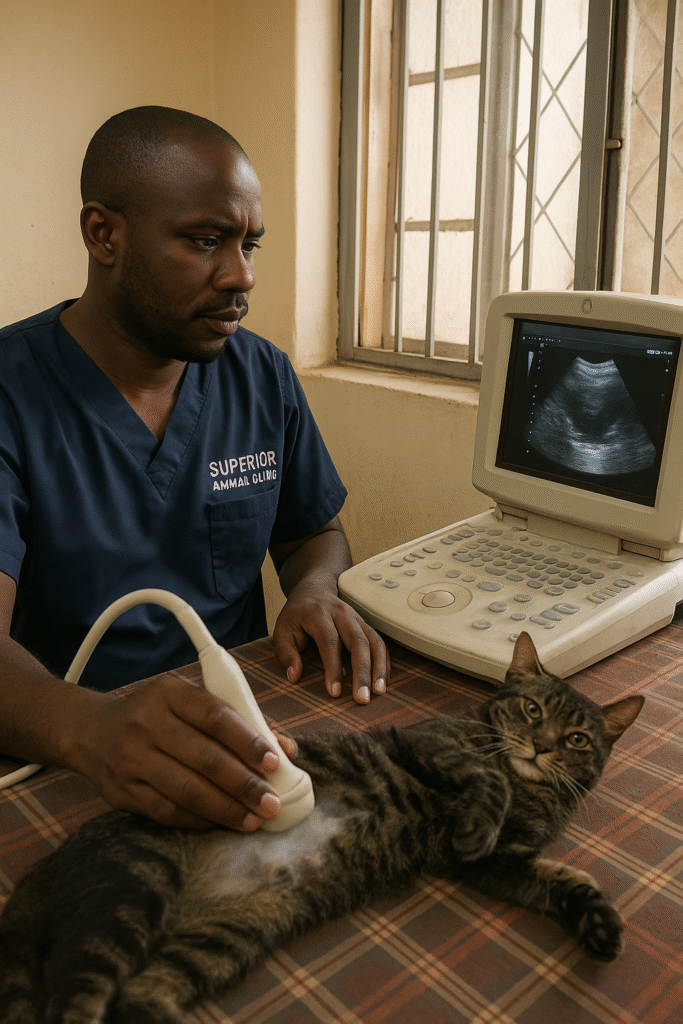
💬 Quick owner-friendly takeaways
- Persians = think PKD; ultrasound early.
- Siamese/purebreds = monitor yearly and prevent dehydration.
- Mixed local cats = watch for environmental risks and feed clean, balanced diets.
- Any cat that’s vomiting, drinking a lot, or losing weight needs immediate testing.
💡 Why Every Cat Owner in Kampala Must Treat Kidney Disease Urgently
Ignoring kidney problems can be fatal. Without treatment, toxins build up fast, leading to seizures, severe dehydration, loss of appetite, and death. Cats hide pain well — by the time you see symptoms, it’s often already advanced.
That’s why prompt veterinary attention at Superior Animal Clinic can save your cat’s life.
🏥 How Kidney Disease Is Treated in Cats at Superior Animal Clinic, Kampala, Uganda
At Superior Animal Clinic in Makindye along Salaama Road, we understand that kidney disease in cats is serious and life-threatening if left untreated. That’s why we follow a step-by-step, personalized approach for every cat, ensuring accurate diagnosis, effective treatment, and long-term management.
Here’s what you can expect when your cat receives treatment at our clinic:
1. Comprehensive Clinical Examination
Every cat begins with a thorough physical assessment.
- Checking hydration levels, weight, and body condition
- Observing behavioral changes like lethargy, hiding, or lack of appetite
- Examining mouth, coat, and eyes for signs of dehydration or toxin buildup
This helps us understand your cat’s overall health and urgency of treatment.
2. Diagnostic Testing
Accurate diagnosis is critical. At Superior Animal Clinic, we use:
- Blood tests – measure urea, creatinine, electrolytes, and kidney function markers
- Urine analysis – detect protein, infection, or crystals that indicate kidney stress
- Ultrasound and X-rays – check for kidney size, structure, or obstructions
- Blood pressure monitoring – high blood pressure can worsen kidney damage
These tests help determine whether the cat has acute or chronic kidney disease and guide the treatment plan.
3. Fluid Therapy
Most cats with kidney disease are dehydrated, even if they drink a lot of water.
- Intravenous (IV) fluids are administered to flush out toxins, restore hydration, and correct electrolyte imbalances
- Subcutaneous fluids may also be given for long-term management at home
Proper hydration is the cornerstone of kidney disease treatment, and it’s carefully monitored to avoid complications.
4. Medication
Depending on the cat’s condition, we prescribe:
- Anti-nausea drugs – to stop persistent vomiting
- Phosphate binders – to reduce toxic buildup
- Antibiotics – if infections are contributing to kidney stress
- Blood pressure medications – for cats with hypertension caused by kidney disease
All medications are customized to your cat’s test results and condition, ensuring safety and effectiveness.
5. Nutritional Management
A proper diet is essential for supporting kidney function. At Superior Animal Clinic:
- We recommend renal prescription diets such as Royal Canin Renal or Hill’s k/d, available locally in Kampala
- Diets are low in phosphorus and protein, but high in essential nutrients to maintain energy
- We provide feeding plans for cats at home, including hydration guidance
6. Ongoing Monitoring and Follow-Up
Kidney disease is often chronic, requiring long-term management:
- Regular blood and urine tests to track kidney function
- Adjustments to medications and diet based on test results
- Home care instructions for hydration, monitoring weight, and spotting early warning signs
This ensures your cat stays comfortable, active, and healthy even with chronic kidney disease.
7. Supportive Care and Comfort
At Superior Animal Clinic, we also focus on improving quality of life:
- Pain relief and anti-inflammatory support for cats with discomfort
- Advice on hydration at home with wet food or subcutaneous fluids
- Guidance for cat owners on reducing stress and maintaining routine
💛 Why Cats Recover Better at Superior Animal Clinic
Cats in Kampala suffering from kidney disease have a higher chance of survival and a better quality of life when treated early by our experienced veterinarians. With advanced diagnostics, personalized therapy, and compassionate care, Superior Animal Clinic is the trusted choice for cat owners
🌿 Home Remedies & Supportive Care for Cats with Kidney Disease in Uganda
While professional veterinary care is essential for treating kidney disease in cats, there are supportive home measures that can help your cat feel better, slow the progression of the disease, and improve overall comfort. These remedies are safe, practical, and adapted to conditions in Kampala and other Ugandan towns.
1. Keep Your Cat Well-Hydrated
Dehydration worsens kidney disease, so maintaining adequate hydration is crucial.
- Provide fresh, clean water at all times, ideally in multiple bowls around your home.
- For cats that don’t drink enough water, try wet foods or homemade broths (chicken or beef, unsalted, no onion or garlic).
- In Kampala’s hot areas like Makindye, Bugolobi, Muyenga, and Ntinda, check your cat’s water bowl several times a day, as high temperatures increase the risk of dehydration.
2. Adjust Diet to Support Kidney Health
Proper nutrition helps reduce strain on the kidneys:
- Low-protein diets specially formulated for kidney support (ask your vet about Royal Canin Renal or Hill’s k/d available in Kampala).
- Avoid feeding human foods, salty snacks, or leftover meats that can worsen kidney function.
- Encourage frequent, small meals instead of one large meal to make eating easier for a sick cat.
3. Monitor and Manage Vomiting at Home
Vomiting is a common symptom of kidney disease. You can help your cat by:
- Offering bland, soft foods like boiled chicken or plain rice in small amounts.
- Giving anti-nausea medications only under vet guidance — do not give human medications as they can be toxic.
- Keeping the feeding area calm and stress-free to reduce nausea triggers.
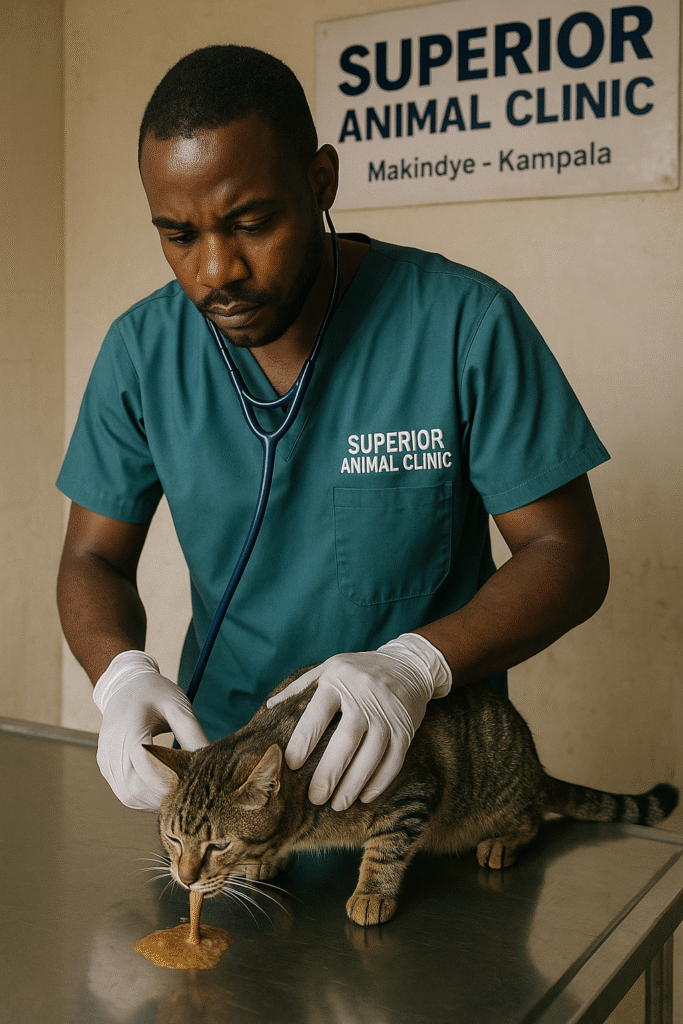
4. Provide a Comfortable, Stress-Free Environment
Stress can worsen kidney disease and reduce appetite. To help your cat at home:
- Provide a quiet, warm, safe space away from loud noises and other pets.
- Ensure your cat can easily access food, water, and litter boxes.
- Maintain a consistent daily routine, especially for feeding times.
5. Herbal Support (With Caution)
Some herbs and natural remedies can support kidney function, but only under veterinary supervision:
- Dandelion leaves can act as a mild diuretic to help flush toxins (use in small, controlled amounts).
- Parsley may support kidney function but can be harmful in high doses.
- Never give any herbal remedies without consulting your vet at Superior Animal Clinic, as improper use can worsen kidney disease.
6. Regular Monitoring at Home
Home care also involves careful observation and record-keeping:
- Monitor water intake, urination, vomiting frequency, and weight.
- Note any changes in behavior such as hiding, lethargy, or loss of appetite.
- Share this information with your vet to adjust treatment plans promptly.
7. Avoid Common Household Toxins
Cats with kidney disease are more sensitive to toxins:
- Keep rat poison, pesticides, cleaning chemicals, and human medications out of reach.
- Avoid giving vitamins or supplements not approved by your vet.
✅ Key Takeaway
While home remedies and supportive care cannot replace proper veterinary treatment, they are essential for improving your cat’s comfort and slowing disease progression. Combined with professional care at Superior Animal Clinic in Makindye, Kampala, these measures give your cat the best chance of living a happy, comfortable life despite kidney disease.
🗺️ Where Cat Kidney Disease Is Common in Uganda — and Why
Kidney disease in cats isn’t evenly spread across Uganda. At Superior Animal Clinic, we’ve noticed certain areas in Kampala and nearby towns where cats are more likely to develop kidney problems. Understanding where it’s common and why can help cat owners take action before it’s too late.
1. Makindye, Katwe, and Nsambya
These neighborhoods are bustling and densely populated. Many cats here are outdoor or semi-outdoor pets, which means they drink water from puddles or eat leftover human food — both major risk factors for kidney infections and toxins. Owners often notice vomiting, loss of appetite, or lethargy when it’s already progressed, which is why early vet intervention is crucial.
2. Bugolobi, Muyenga, and Buziga
These areas are home to many older cats, and kidney disease often strikes older, indoor cats slowly over time. Cats in these neighborhoods are usually well-fed, but sometimes over-reliance on dry kibble or irregular hydration causes chronic kidney stress. By the time owners notice vomiting or excessive thirst, the disease may be advanced.
3. Ntinda, Naguru, and Kololo
Cats in these upscale neighborhoods are often pampered, but even indoor cats aren’t safe. Aging, dehydration, and underlying infections are common causes of kidney disease here. Owners may search online for phrases like “why is my cat not eating” or “best vet near me for cat kidney disease in Kampala” because they notice subtle signs like reduced activity or sudden weight loss.
4. Old Kampala, Rubaga, Kasubi, and Lungujja
These areas have more free-roaming and mixed-breed cats, often exposed to contaminated water or unsafe food. Kidney disease here is frequently linked to toxins, infections, and untreated urinary tract issues. Owners may see persistent vomiting, bad breath, or extreme thirst — signs that require urgent care at a trusted vet clinic like Superior Animal Clinic.
5. Nakawa, Lugogo, Ndejje, and Bukoto
In these busy urban zones, cats are often overlooked until they show severe symptoms. Chronic kidney disease is common due to age, dehydration, or diet-related stress. Cat owners searching for “cat vomiting non-stop Kampala” or “urgent vet near me” often discover Superior Animal Clinic as the reliable option for early diagnosis and life-saving treatment.
Why These Areas Are High-Risk
Across Kampala, urban lifestyle, lack of clean water, high temperatures, improper diet, and delayed vet visits are the main contributors to kidney disease in cats. Even well-cared-for cats can develop kidney problems if subtle early signs are ignored. That’s why Superior Animal Clinic in Makindye emphasizes regular checkups, early testing, and professional treatment to prevent complications and save lives.
🌟 Why Choose Superior Animal Clinic for Cat Kidney Disease Treatment in Kampala
- 🐾 Experienced Veterinarians specializing in feline kidney care
- 🧪 Advanced diagnostic equipment for accurate diagnosis
- 💉 Safe, effective treatment methods tailored to your cat
- ❤️ Compassionate care — we treat every cat like family
- 📍 Easily accessible from all areas of Kampala and nearby towns
If your cat is vomiting, not eating, or acting weak, call or visit Superior Animal Clinic in Makindye along Salaama Road today.
🐱 Cat Kidney Disease FAQs – Kampala, Uganda
1. What causes kidney disease in cats in Kampala, Uganda?
Kidney disease in cats is caused by dehydration, infections, toxins, poor diet, and aging. In Kampala, factors like hot weather, outdoor exposure, and unclean water make cats more vulnerable.
2. My cat is vomiting and not eating in Kampala — could it be kidney disease?
Yes. Persistent vomiting, loss of appetite, excessive thirst, or weight loss are classic signs of kidney disease. Visit Superior Animal Clinic in Makindye along Salaama Road for prompt testing and treatment.
3. Can kidney disease in cats be cured?
Acute kidney disease can sometimes be reversed if treated early. Chronic kidney disease cannot be cured but can be effectively managed with proper veterinary care, medication, and diet.
4. How much does cat kidney treatment cost in Uganda?
Costs depend on severity, diagnostics, and treatment methods, typically ranging between UGX 80,000 – 400,000. Superior Animal Clinic provides transparent pricing and personalized care for every cat.
5. What food is best for cats with kidney disease in Uganda?
Cats with kidney disease need specialized renal diets, such as Royal Canin Renal or Hill’s k/d. Our vets at Superior Animal Clinic can guide you to local suppliers in Kampala.
6. Can I treat my cat’s kidney disease at home?
No. While supportive care like hydration, wet food, and proper diet helps, professional veterinary treatment is essential to prevent severe complications.
7. Where can I find the best veterinary clinic for cat kidney disease treatment near me in Kampala?
The most trusted option is Superior Animal Clinic, located in Makindye along Salaama Road, serving all neighborhoods including Ntinda, Old Kampala, Lungujja, Kasubi, Nsambya, Katwe, Zana, Nakasero, Buziga, Munyonyo, Nakawa, Rubaga, Muyenga, Naguru, Bugolobi, Kabowa, Kabojja, Lugogo, Lubowa, Seguku, Ndejje, Kololo, Mutundwe, Bukoto, Bulindo, and Kulambiro.
8. What happens if kidney disease in cats is not treated?
Untreated kidney disease leads to toxin buildup, dehydration, organ failure, and death. Early detection and treatment at Superior Animal Clinic can save your cat’s life.
9. What types of kidney disease affect cats in Uganda?
Cats in Uganda commonly suffer from:
- Acute kidney disease – sudden, often reversible with treatment.
- Chronic kidney disease (CKD) – develops slowly, common in older cats, requires long-term management.
10. Which cats are most at risk of kidney disease in Kampala?
Older cats, Persian cats, Siamese, British Shorthairs, and mixed-breed outdoor cats are most prone. Factors include age, genetics, dehydration, diet, and exposure to toxins.
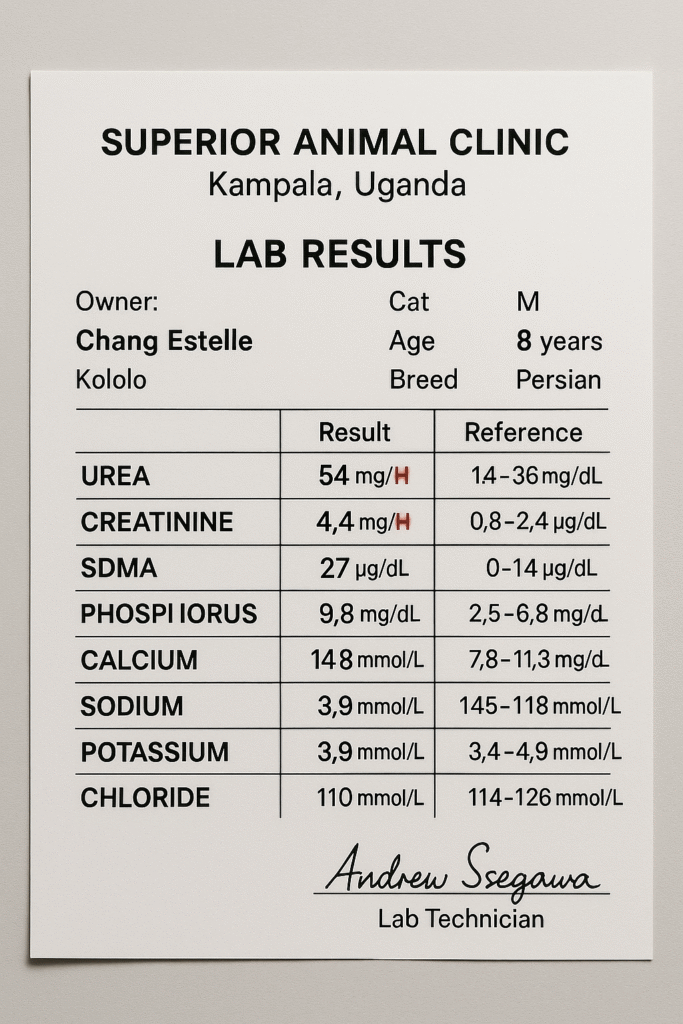
11. How can I prevent kidney disease in my cat in Kampala?
- Provide clean water at all times
- Feed wet or kidney-friendly diets
- Avoid giving human food, salt, or toxins
- Schedule regular vet checkups at Superior Animal Clinic
- Monitor for early signs like vomiting, lethargy, or excessive thirst
12. How quickly should I take my cat to a vet in Kampala if I notice vomiting or lethargy?
Immediately. Cats hide pain well, and early intervention is critical. Superior Animal Clinic can perform blood tests, urine tests, and ultrasound diagnostics to detect kidney disease early.
13. Is kidney disease common in certain areas of Kampala?
Yes. High-risk areas include Makindye, Katwe, Nsambya, Buziga, Muyenga, Ntinda, Naguru, Kololo, Old Kampala, Rubaga, Kasubi, and Lungujja due to factors like dehydration, outdoor exposure, and diet-related issues.
14. Can older cats recover from kidney disease in Uganda?
Yes. While chronic kidney disease requires ongoing management, older cats can maintain quality of life with proper care, hydration, diet, and veterinary supervision at Superior Animal Clinic.
15. How often should my cat have kidney checkups in Kampala?
For cats at risk (older cats, Persians, Siamese, or cats with previous urinary issues), every 6 months is recommended. Early testing at Superior Animal Clinic helps detect kidney disease before symptoms appear.
16. What treatments are available at Superior Animal Clinic for cat kidney disease?
- IV fluid therapy for dehydration and toxin removal
- Medications including antibiotics, anti-nausea drugs, and phosphate binders
- Prescription renal diets to support kidney function
- Ultrasound and blood monitoring to track disease progression
- Home care guidance to improve hydration, diet, and comfort
17. Can my cat live a normal life after kidney disease treatment?
Yes. With early detection, proper treatment, and ongoing management, many cats in Kampala continue to live active, happy lives.
18. Who is the best vet for cat kidney disease in Kampala?
The most trusted vet for cat kidney disease treatment in Kampala is the team at Superior Animal Clinic in Makindye along Salaama Road. Our veterinarians specialize in feline kidney care and provide personalized treatment plans for every cat.
19. Which is the best veterinary hospital for cat kidney disease in Uganda?
Superior Animal Clinic is recognized as the best veterinary hospital for cat kidney disease in Uganda, serving all neighborhoods in and around Kampala, including Ntinda, Bugolobi, Muyenga, Buziga, Munyonyo, Katwe, Old Kampala, Rubaga, Kasubi, Lungujja, Makindye, and Kololo.
20. Can kidney disease in cats cause vomiting only at night?
Yes. Cats with kidney disease may vomit intermittently, often when toxins accumulate in the blood. Any persistent vomiting, day or night, should be evaluated immediately by a vet like Superior Animal Clinic.
21. How do I know if my cat’s vomiting is related to kidney disease or just food issues in Kampala?
Kidney disease often comes with other signs like excessive thirst, frequent urination, weight loss, and lethargy. Food intolerance usually doesn’t affect drinking habits. Blood and urine tests at Superior Animal Clinic can confirm the cause.
22. Can young cats get kidney disease in Uganda?
Yes, though it’s less common. Young cats may develop acute kidney disease due to infections, toxins, or congenital defects. Early detection is crucial to prevent permanent damage.
23. How can I monitor my cat at home for early signs of kidney disease in Kampala?
Look out for:
- Frequent vomiting
- Excessive drinking or urination
- Lethargy or hiding
- Poor coat condition or weight loss
Regular checkups at Superior Animal Clinic ensure early intervention.
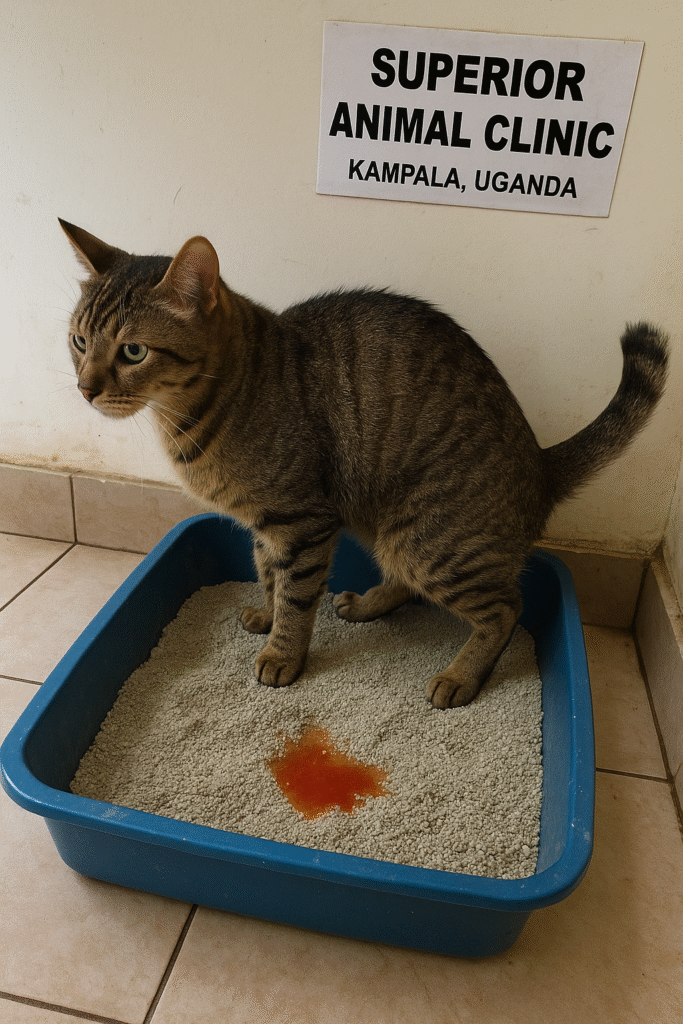
24. Are there specific medications available in Uganda to treat cat kidney disease?
Yes. Superior Animal Clinic provides veterinary-approved medications including anti-nausea drugs, phosphate binders, and antibiotics for infections. These are carefully prescribed based on your cat’s test results.
25. Can outdoor cats in Kampala survive kidney disease better than indoor cats?
Not necessarily. Outdoor cats are at higher risk of toxins, infections, and dehydration, which can worsen kidney disease. Indoor cats are safer but can still develop chronic kidney disease due to age and diet.
26. How long does kidney disease treatment take for cats in Uganda?
Treatment duration depends on the type and severity of kidney disease. Acute cases may improve within days with IV therapy, while chronic cases require long-term management, regular monitoring, and diet control at Superior Animal Clinic.
27. Can cats with kidney disease in Kampala play and live normally?
Yes. With proper treatment, hydration, and specialized renal diets, many cats continue normal activities, play, and enjoy life. Superior Animal Clinic provides guidance to maintain their quality of life.
28. Is there a vaccine or preventive medicine for kidney disease in cats in Uganda?
Currently, there is no vaccine for kidney disease, but preventive care includes:
- Regular vet checkups
- Clean water and proper diet
- Early treatment of urinary or systemic infections
Superior Animal Clinic helps cat owners implement these preventive measures.
29. Can kidney disease be hereditary in cats in Uganda?
Yes. Certain breeds like Persians, Siamese, and British Shorthairs are genetically more prone. Regular screenings at Superior Animal Clinic help detect early signs in at-risk breeds.
30. How do I find the nearest vet for cat kidney disease in my neighborhood in Kampala?
The best option for all neighborhoods including Ntinda, Old Kampala, Lungujja, Kasubi, Nsambya, Katwe, Zana, Nakasero, Buziga, Munyonyo, Nakawa, Rubaga, Muyenga, Naguru, Bugolobi, Kabowa, Kabojja, Lugogo, Lubowa, Seguku, Ndejje, Kololo, Mutundwe, Bukoto, Bulindo, and Kulambiro is Superior Animal Clinic, Makindye along Salaama Road. Call or WhatsApp for an appointment today.
🐾 Visit Superior Animal Clinic Today
If your cat is vomiting, not eating, losing weight, or drinking a lot of water, don’t wait.
Visit Superior Animal Clinic, Makindye along Salaama Road, Kampala — the #1 trusted veterinary hospital for cat kidney disease treatment in Uganda.
📞 Call/WhatsApp: +256 771909946
📍 Location: Makindye, along Salaama Road, Kampala, Uganda

Yo, what’s up with okjlactivity? Heard some buzz, checked em out. Seemed legit. Anyone else tried playing here? Let me know! okjlactivity
Thank you for your sharing. I am worried that I lack creative ideas. It is your article that makes me full of hope. Thank you. But, I have a question, can you help me?